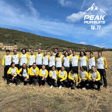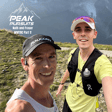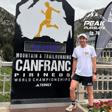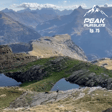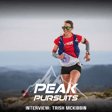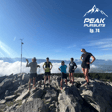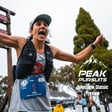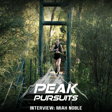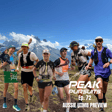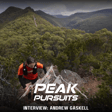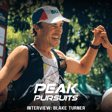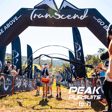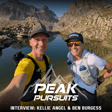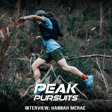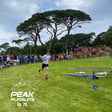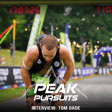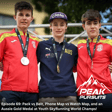Introduction from Zakopane
00:00:08
Speaker
and welcome to episode 68 of the Peak Pursuits podcast. My name is Simone Brick. I am coming to you from a lovely media library in Zakopane in Poland.
00:00:20
Speaker
which is a fun place to be
Weather Talk: Poland vs. Australia
00:00:22
Speaker
recording. um They've put me up in a nice room here and I am lucky enough to be joined by Jess Jason back in Oz. You're the one holding down the fort in on Aussie soil this week. Jess, how are we going?
00:00:32
Speaker
Yeah, I'm good. Just surviving winter. Very jealous of you guys being on the other side of the world.
Travel Plans and Weather Hopes
00:00:40
Speaker
Yeah, although I will say it's not like its not exactly summery where I am at least. It's very rainy and um not the not the most are conducive weather to being outside most days, but that's fine.
00:00:52
Speaker
I'm about to head somewhere better. And ah someone who I hope is, I don't know what the weather's like where you are, Brodie. A, where in the world are you? And welcome, Brodie, for joining us. Hey, guys. Yeah, i in I'm in Edinburgh now, actually. So back okay Back in Edinburgh again.
00:01:07
Speaker
um After last year, I spent a bit of time here. It's quite sunny, actually. um It's a bit cooler, though, but Norway, where I was last week, was actually like unseasonably warm.
00:01:17
Speaker
So it was like quite a whole time, which was quite nice. Nice. We'll take that. i am I'm off to Annecy very early tomorrow morning and I'm looking forward to some summer, um finally. It feels like I came over for a Euro summer and I've gotten thunderstorms and rain.
00:01:33
Speaker
um So I haven't quite got the taste of it yet. But um yeah, an interesting episode coming
Jess Joins World Champs Team
00:01:40
Speaker
up for everyone this week. We're going to be checking in with Jess after she wasn't on last week and it was announced making the World Champs team.
00:01:49
Speaker
That is the race in September she has been referring to for a while now. ah Brodie on his usual travels and i did attempt to race so I'll give the rundown of what that attempt looked like but to start with Jess congratulations on making the team now that we can finally say it and how are you feeling?
00:02:11
Speaker
Thank you Yeah, super excited to be able to um yeah like talk about it now and obviously like super excited to be on the team. um Yeah, like having made the team like like two years ago and then not being able to race, um it was one of my big goals over last two years to race.
00:02:30
Speaker
make the team again and be healthier and stronger leading into the start line. So feel like I'm on track for that, which is nice. Awesome. Awesome. And yeah, I'm so stoked for you because yeah, I know the whole like you just want to remedy past horribleness essentially or things that happened that you're like, okay, we can put that to bed once you've gotten to this start line. But how's the training week looked?
Training Adaptations for World Champs
00:02:57
Speaker
Yeah. um and how's the body feeling this week in terms of getting to the start line and what do you also ah how are you like adapting your training for the brutality of this course now that we can say exactly what the course is because it's like gonna be pretty wild and long and slow yeah yeah I think like it was it's almost been like a blessing in disguise that like I've had a bit more time to get used to trail running before doing something like this um because I feel like if I had competed at Worlds two years ago, it would have been a massive shock.
00:03:34
Speaker
um So, yeah, like I still think it's going to be a massive shock. Like it's a thousand metres more elevation gain um over the distance that I've ever done, like a thousand more than Hounslow, which is probably like the most hectic race I've ever done. so And, yeah, I haven't raced in Europe before. So, yeah.
00:03:55
Speaker
um I think I'm just trying to like lean into my strengths, which is being strong. like yeahp So being consistent in the gym. um I think that's like a really important one for me.
00:04:07
Speaker
um And then I've started getting into like the longer runs now. um So you just ticked off for three and a half hour. run over the weekend. um And yeah, i Charlie and Mikey showed me this route out in the Brindabillas. That's, it's probably like one of the hardest like runs I've ever done.
00:04:29
Speaker
um It's yeah, you get like almost 2000 meters over 30 K, which is pretty hectic. And yeah, it's just brutal on the legs. Like your muscles just like get so tired by the end from like the long downhills and the uphills. um So I think it's a good one to do to get the legs like conditioned for what's to come in Europe.
Dietary Changes for Training
00:04:53
Speaker
But, yeah, I've just, like, really, like, in between now and UTA, I've just, like, really focused on um getting a lot more food in, and like, both during running and, like, outside. And it's been, like, day and night with how I felt. Like, I wake up after these three and a half hour runs and I'm, like, shocked by how I feel, like, how good I feel um because it's just, like, so different to how was feeling at the start the year.
00:05:22
Speaker
um And I think like i like i didn't know i was probably under eating before because like as a vegan it is hard because you have to eat so much um quantity to get like the same calories in.
00:05:36
Speaker
Yeah. um So yeah, I think I've definitely been like under fueling like for a long time um because just and having made that change, like it's it's been a game changer. So I'm glad I figured that out now, but it is kind of frustrating, like being just like something so small that could have made a huge difference. Yeah.
00:05:59
Speaker
I love that moment where you go, why did past me not know this? Yeah. Yeah. At the same time, all you can do is go off the information you have at any point in time. so yeah Yeah, and it's pretty crazy, like the whole, like, let's say five years ago, the whole sort of um five to 10 years ago, ah whole setup and all the messaging coming out was was about sort of being, like eating what the the ne the bare minimum of what do you needed to eat so you could train. and And it's crazy how, like...
00:06:32
Speaker
how that's shifted and it's really good to see. um But those sort of messages, I think they sort of stick in your brain a little bit, even if you're not consciously thinking about them. um Definitely, yeah. So, yeah, it's it's good to see. And, and like, i've I've noticed the same
Simone's Nutrition Insights
00:06:45
Speaker
thing, Jess. Like, I've gone through periods where I definitely think I'm under-fuelled, not even purposely, just...
00:06:51
Speaker
because of that or history or whatever it is um and then when you do eat enough it's like oh actually i can walk around this morning i feel good it's like it's so important for recovery but because even like five years ago the messaging was like fuel for the work but it's really like there's a huge element of fuel after the work as well especially when there's more work to be done the next day so yeah i think yeah it's um it's that's really cool to hear Yeah, and I think for me it's always been like, because I grew up with like really healthy parents, so they would always be like, don't have Coke, like don't have sugar.
00:07:25
Speaker
um And I need to have that stuff now to get enough calories. 100%. Yeah. She's changing that mindset around bad foods. Shifting the mindset, but those are bad foods if you're not doing much and you consume lots of them. They're not so much bad foods if you're burning the energy instantaneously nearly and you have such a higher energy like requirement that they're actually necessary, like you said, sometimes.
00:07:52
Speaker
Yeah. Especially, as you said, being vegan, like you have to go for some of those higher calorie vegan options and that don't just come with a bunch of fiber. um Because, yeah, that's where I used to be running into trouble of like, I've already got guts that aren't very good with a lot of things um and too much fiber can actually stop you absorbing.
00:08:13
Speaker
all the nutrients you are taking in. So you have to go after you've got your sort of daily allotment of the normal person, healthy food, you actually kind of have to turn to low fiber, high calorie options in order to actually just get what you need in.
00:08:30
Speaker
And i loved, um years ago, I heard someone speak, I honestly can't even remember who it was, but I kind of adopted it at the time um it was a professional athlete, I think maybe a triathlete.
00:08:42
Speaker
And I remember hearing an interview with them and them going, yeah, the more I can eat, the more it's my superpower. so i And there's no such thing as overeating for the amount of work I'm doing. So I look at it as if I can get more in, I'm going to be more powerful the next day, which then means I'm more powerful in future sort of thing. So she literally was like, eating is my superpower because I'm
ASICS Altitude Camp Experience
00:09:03
Speaker
anything and everything I can to get more out of myself and I was like that makes sense I like it yeah Yeah, and then I think like the only like tough thing that comes with changing your diet in that way um is like the gut issues that I've had in the last few weeks. um like Even though I've been feeling amazing and my my body feels super strong and I feel really fit, um just like yeah a lot of nausea um in sessions when my heart rate gets above thresholds
00:09:38
Speaker
um So still trying to like figure out what exactly it is, but I do think it is related to just like the change in my eating habits that I've been doing because it's like coincided.
00:09:52
Speaker
um So I'm hoping my body is just getting used to the change um because, yeah, last week wasn't great, but then today was. So it's like, yeah, I don't know. I think slowly it's getting better hopefully. Yeah.
00:10:11
Speaker
It's not something that concerns me too much because like if I do need to vomit in a session, I just do it and then I keep going and I'm fine. You're used to it. Also, in the race that you're training for, your heart rate shouldn't ever really be going above threshold.
00:10:27
Speaker
So you should be sitting below that at a level where hopefully your body is okay with the um than nutrition side of things. And remind me, how long before world Champs are you travelling over?
00:10:41
Speaker
Two weeks before. Nice, nice. So you've got and you've got another sort of adjustment period in some ways to, you're going to Font Remo? Yeah, so luckily I'm able to stay at the Assics Altitude Camp.
00:10:56
Speaker
So been seeing a lot of the other athletes posting about it, getting ready for the Athletics World Champs. very excited to live the professional athlete lifestyle for a bit.
00:11:07
Speaker
Nice. Although I will be kind of working. I'll be working remotely from there because, yeah yeah, I don't get heaps of annual leave, but I'm lucky that I'm able to do that. So, yeah, looking forward to it.
00:11:19
Speaker
Yeah, that'll be sweet. And that gives you plenty of time to sort of adjust to altitude and those sorts of things as well from font re remote. Yeah. Yeah. I, yeah. Apparently you need like longer than that, but that's all I could do. So like there's what's perfect and then there's what you can manage, right? Like I think two weeks is a lot better than the sort of one week or less because I find the second week at altitude is always a lot better than the first.
00:11:44
Speaker
um And then they say ideally three weeks, but I think you're doing, you're still doing a lot better than just rocking up a few days before and your body not having any,
00:11:57
Speaker
experience with the altitude or the terrain like i think you'll be fine you'll be good yeah yeah if you if you want if you want like hemoglobin changes you you probably want like three weeks but like if you're just adjusting two weeks is plenty i think i think it's like 10 seven to 10 days is probably the minimum you're looking for if you want to just adjust to altitude You probably got that nailed. Cool.
00:12:21
Speaker
Yeah. So, yeah, unfortunately I couldn't really get like a race in beforehand. I am racing this weekend in um a relay, which will be fun.
00:12:33
Speaker
and And I'm doing like a mini taper for that. So I'll just do one session this week um and then freshen up for that, which will be good. i'm I'm feeling super keen to like,
00:12:45
Speaker
for like a really hard effort. So it's nice to have that feeling again. Nice. That's cool. That's cool. Well, yeah, we'll we'll keep keep i everyone posted on how that goes because, yeah, always nice to have just an excuse to go all out and see what happens.
00:13:00
Speaker
um Yeah. But, yeah, I think you're in a good spot and it must only be a few weeks until you leave. Really? Like four weeks, five weeks? Yeah, a bit over four. Yeah, five weeks.
00:13:11
Speaker
Yeah. Nice. Nice. Exciting times. I think it's about eight weeks, about eight weeks to a race to earthing. Oh, perfect. Perfect. Still plenty of time to get all of the things you need in place. So absolutely love that for you.
00:13:27
Speaker
Now, Brodie, you're getting ready for the same race. Do you have any, just before we get into what you've been up to this week, do you have any races before world champs now are you done? Not really.
00:13:39
Speaker
No, no, I'm sort of done. I will do a few small things, but um not really. If there's something local that I see that I want to jump in um because I want to try and get a few sort of specific race intensity sessions in and it works out and I will do something, but nothing that I'm planning at this stage or traveling for.
00:13:56
Speaker
So and the focus for me was to One, like this year's goals were to get to the Orienteering World Champs and try and make the trail running world champs and then do as best as I could at those two races while just getting my body right at the same time.
Brodie's Training Goals
00:14:11
Speaker
So, yeah, I thought that adding more races to the schedule would just add unnecessary stress. So, yeah, just traveling around and training really and then hoping that na I'll get myself into as as good a shape as possible like I'm still not expecting to be perfect by world champs um but I'm hoping that I can sort of still do it and and and my real goal is like finish world champs and not be my achilles in a horrible position afterwards like it'll be a bit sore for a few days but I don't want to have to have time off afterwards so um yeah I guess I'm just conditioning myself to be able to tolerate the distance and hopefully that gives me a good amount of fitness at the same time
00:14:49
Speaker
Yeah, yeah, nice, nice. So what has that training looked like this past week? Yeah, so was a bit, I flew down to Oslo and i was like in the south of Norway ah visiting my friend who has like a little like farmhouse out east, no west of Norway, ah west of Oslo.
00:15:09
Speaker
um So yeah, was still doing a little bit of travel stuff, but um I was away from the Lofton Islands where it was like super steep. So it was a little bit nicer.
00:15:20
Speaker
um i could get a little bit more running in without ah feeling like I was so hiking up every steep little climb. um So yeah, I did a few runs in Lofton at the start of the week.
00:15:32
Speaker
And then I, on Wednesday, ah did like a little bit of, yeah, I wouldn't even call it threshold. We did, my friend was doing some orienteering training. um And usually in that sort of training, the sprint stuff, I'd be doing like thresholdy effort.
00:15:47
Speaker
um But I didn't really want to trigger my Achilles too much. So I just... when it whatever felt comfortable. And I was probably running like somewhere like around marathony effort, just like a bit lower than threshold, but it felt pretty good. So that was fun.
00:15:59
Speaker
yeah um And I'm trying to incorporate some strides. Like I'm not doing sessions at this stage. I'm just trying to get into more volume and get consistent volume.
00:16:10
Speaker
um and But I still want to keep my legs moving a little bit. So I'm trying to sort of do strides at least one or two times a week. So i did some strides after that. um Then on Thursday we did like a big mountain run.
00:16:24
Speaker
We were going pretty slow because it was like a, it wasn't really a trail. um It was probably a little bit similar to maybe what you've done at Strander. Yeah, there's definitely no trails at some of them. It wasn't was that really a trail.
00:16:39
Speaker
And I think even the bit that we climbed on was like, it was like a very, like a hunter's track type of thing. So it was, there was no marking or anything. we were just sort of trying to see, trying to like track the trail nearly. And then it sort of petered out at the top, but that was really fun.
00:16:56
Speaker
Did a big, yeah, we did about 1,200 metres of And most of that was sort of like, um and most of that was sort of like over terrain, which was which was cool. um So that was really, really fun.
Scenic Sauna in Norway
00:17:07
Speaker
And then that Thursday, I probably did like the coolest sauna I've ever done in my life. My friend booked this, um there's this really nice sauna that's like on one of the lakes. um And it was just spectacular. Like the lake had like that classic sort of ah Norway sort of fjord look where like the big steep hills coming down into the lake and the sauna was like on there sort of like looking out at it um and the sauna had like a big glass window across the front.
00:17:34
Speaker
Oh wow. So yeah that was pretty good but we did like we had a book for like I think they had like two hour sessions so we did a proper sauna like like a proper performance sauna so we were enjoying the view but also suffering a little bit so it was cool. I enjoyed that.
00:17:50
Speaker
Nice. um And then, yeah, I was in Oslo over the weekend and I got out on the trails a few times, um including on so Sunday where I did two hours or just over two hours.
00:18:03
Speaker
And I ran about, yeah, it was 21 and a half K. The trails are actually a bit slow. My friend always runs in this forest and supposedly he gets shit because he's running too slow. And he says, no, it's the trails. It's the trails.
00:18:15
Speaker
And then um I ran there and I was like, okay, yeah, it is the trails. But he also said I ran too fast because now it makes him look bad because he was using it as an excuse. And I and i ran like 40 seconds per K faster than he normally does.
00:18:28
Speaker
And he's he is better than me as well. So he's like, you ran too quick. You're making me look bad. um But that was that was really positive. um I yeah finished the week with,
00:18:39
Speaker
And that run felt like the best two-hour run I've done in whole this whole rebuild. um And I did it at the end of, say, like a 90K week. um So, yeah, I was... ah So my biggest my biggest week in eight months and my biggest run, my best sort of feeling over two hours.
00:18:56
Speaker
So, yeah, that was really positive. And and I feel like my body's in... in a I keep saying it's sort of like getting better and better which it is um but it's starting to feel a lot more positive like I feel like when you can run 80 to 90 kilometers a week you start to feel more like a like it's it's not normal training but it's feeling more like normal training um yeah compared to when I was doing 50 60ks doesn't really sort of hit the hit the same way um so yeah it's feeling I'm feeling pretty positive about it and hopefully I can sort of
00:19:29
Speaker
keep that volume through to world champs and then I'm going to try and get in as much sort of like as my Achilles allows, like try and get a few sort of race intensity sessions and then build up how long I'm doing race intensity for.
Challenges of World Champs Course
00:19:44
Speaker
Yeah, race intensity for the race you're doing, like even when you say you were doing marathon effort, like that's harder than race intensity for what you're doing. Yeah, that's probably harder. Yeah, yeah. So it's more like, getting out into, yeah, just on my long runs, like at the moment that long run was probably like more like easy, not easy long run, but like I wasn't pushing.
00:20:05
Speaker
Whereas yeah I'm going to try and in those longer runs, I'm going to try and start building in that slightly harder than that intensity, which isn't actually not that much faster, but you're just pushing a little bit harder.
00:20:16
Speaker
um and then build up the volume that I can do of that. And I'm feeling pretty confident that I can put together a pretty good race at World Champs, especially because it is so steep up yeah and down. Like it's the faster running that seems to be more of an issue for me. So I'm thinking that hopefully that will be all right. It's more the volume that I need to make sure I can handle.
00:20:38
Speaker
Well, yeah, I think for the World Champs race, there will be times where your intensity of your effort is actually really low. due to the terrain. So like, yeah and i'm I'm basing this off um also, well, having done similar races, but Tetra Sky Marathon, what we just did,
00:20:57
Speaker
um Even having spoken to Martin, who I'm actually now taking a bet that he's going to be like top three at world champs after what he did on the weekend. um But talking to him after the race, because our race was 45K with 3,300 and something.
00:21:15
Speaker
So like not much less elevation. And I would say just as if not more technical at times. um And he was saying that for so long he felt like he was jogging.
00:21:26
Speaker
and um because of the terrain. Like it was just so slow. So like you can push the climbs, but there's, which obviously brings your heart rate up. um But, and having done races similar to this before, they almost feel like fartleks instead of long, steady efforts.
00:21:43
Speaker
It's like yeah push the climb and then your heart rate gets high, but then across ridge lines and climbing up and over rocks and stuff, it's your heart rate drops out of necessity because the the terrain dictates what you're doing. So Yeah, it's and it's an interesting thing to train for because it's not like you sit at one heart rate and one effort for the four to six hours that it's going to take.
00:22:04
Speaker
um yeah It's like you have to almost get used to, like he was saying how annoyed almost he was getting about how slow he felt like he was moving in a race. He's like, this isn't race effort, but I'm going as hard as like the terrain's letting me.
00:22:17
Speaker
um Which, yeah, I think getting also being mentally prepared and getting used to that kind of thing can be important in some ways. yeah Yeah, I think so. And like I'm going to be in, I'm in Scotland now um and we're going to, we're staying at my friend's house for a few days, but then we're sort of doing a road trip around the highlands and then going to Ireland and then heading down
Technical Terrain Training
00:22:40
Speaker
to Spain. And like all of those places will have some sort of like technical terrains, like especially the Scottish Highlands. I know from experience, like there is some really intense routes and I'm going to probably try and get on a few of them.
00:22:52
Speaker
um So, yeah, I'm looking forward to that's the sort of stuff I love doing as well. So I'm actually quite excited to train for this World Champs because it is like it's the sort of stuff that I like. And and that's why this World Champs particularly like maybe if it was somewhere else, I wouldn't have tried to get in the team like i may not have even nominated given where my body was at because I knew this world chance would probably be one that somewhat suits my style of running um I really wanted to sort of put my hat in the ring so yeah looking forward to it and I'm feeling pretty positive at the moment so it's good.
00:23:24
Speaker
Yeah nice I think. but I also agree with what what Jess was saying before um in that I'm sort of and doing my best to get back into strength which is obviously quite difficult when you're traveling but um when I was in the Lofton Islands I paid for like a week-long gym membership and the other day in Oslo I went to the gym for a drop-in pass and it's expensive but like I think that the strength component will be super important for this race yeah the uphills and the downhills both of yes so if you condition if your muscles are strong to tolerate the downhills but also if you're stronger you're going to be strong you're going to be more efficient on the uphills so I think for
00:24:04
Speaker
trail running even more than road running the strength is important and for this race I think it'll be quite important so I'm looking forward to trying to continue that as much as I can as well I've spent the morning looking at Google and seeing what gyms are on my route that we're doing in the Scottish Highlands and seeing which ones I can do a drop in for yeah nice Nice. Hopefully you can keep that up. Cause yeah, I'm a hundred percent agree to strength.
00:24:27
Speaker
Strength is ah really, really important. The more technical it gets, cause you end up doing like, you can end up doing essentially step ups and step downs for ages on end, which yeah doesn't use your running muscles much at all.
00:24:42
Speaker
It's like, you've got to be used to doing that in the gym. Um, really? yeah. Nah, good call. And I reckon you're in a good spot. It's really good to hear about that two-hour run um and sort of the momentum you're building in terms of the specific preparation you need for this race. Like, you're in a good spot.
00:25:00
Speaker
Yeah, thank you I'm forward to it. Hopefully this continues.
Sponsor Shoutout: Bix
00:25:07
Speaker
This episode is proudly brought to you by Bix. Bix has supported the show from the start and personally, I'm really loving the big 40 gel. Whether you're just going out for a 60 minute run and want the one gel, you're a moderate carb fueler and have 80 grams an hour, or like myself, you're trying to hit that 120 grams an hour range, it makes the maths super easy.
00:25:27
Speaker
Not only is the 40 grams of carbs, but I really like the fact there's 200 milligrams of sodium. It's a nice number that's not going to overload you if you're going high carb fueling, but it also means you don't have to carry around any annoying little salt tablets.
00:25:38
Speaker
And again, the natural flavor, I've always been a fan of that. There's no palate fatigue. The consistency is really nice and thin. It goes down super easy. So I've become a really big fan. If you want to give that a go or try out any of the rest of the range, head over to website, use code PPP at checkout to save yourself 20% off the entire range.
00:25:56
Speaker
And with that, let's get back to the show.
Health Concerns and Pre-Race Stress
00:25:58
Speaker
um suppose that comes to my unfortunate update, which kind of sucks, but we'll survive. um Yeah, my last few weeks, have because when was I last on the pod? Like a week before I left, um which was the last time I felt decent, I must admit.
00:26:18
Speaker
but um But yeah, I think last time I was on was just after I'd done the sort of 10K cross um And then the day after that had my last like five hour long run, which felt fine um and felt really good.
00:26:32
Speaker
And then um I had found out at that point, this is just giving all the context before I get to the race, but I had found out at that point that I was low in iron. So had an iron infusion um and I spent the next week really tired and I skipped on my heat training.
00:26:50
Speaker
skipped on my gym um or almost on my gym I did some Pilates and almost every run like the Tuesday I was meant to double I didn't double the Wednesday was meant to be a ri ah I was meant to go longer than I did.
00:27:06
Speaker
um But I did do still a two-hour sort of race effort on the Wednesday. And I can just remember being in the middle, at the end of that race effort, going, wow, that wasn't, that was like what race effort, what race pace should be in a way for the sort of six-hour race I was looking at. But yeah.
00:27:25
Speaker
I felt destroyed. Like I was, couldn't do anything for the rest of the day. I was meant to do a flat session the next day, pushed that to the day after. um And now we're like two days before I fly out.
00:27:37
Speaker
And I did my last session and I was kind I got two Ks into, it was 4K, 1K flat. flat And I remember getting 2Ks into the 5K going, this is not feeling good.
00:27:50
Speaker
Like I was running 410 per kilometre for that 5K, feeling like I was running like 345. um But I was at that point putting it down to low iron and just going, you know what, it's fine. 410s is so fine for today. Let's just get through the session.
00:28:07
Speaker
And I did. I finished the session um and pushed through. Again, didn't double The next day i was meant to go for like three hours and I think I went for two hours so oh slow because I couldn't move any faster.
00:28:20
Speaker
And then on the Sunday, which was the day I flew out, instead of running, I went for a hike because I was like, I can't run, which wasn't exactly the ideal way to then get on a plane and come overseas. But at that point, I really just thought it was kind of the stress of packing and pre-travel and to be fair, also on the Sunday,
00:28:38
Speaker
I had been out to a Bliss and Esso concert the night before. So ah had all these other things to like blame in a way and go, this is fine. This is just like all these things coming together and I'll fly over there and we'll be good.
00:28:52
Speaker
um Then fly over and, of course, then I've got this sort of, well, it's jet lag now because my first couple of runs when I was over here, I think my first run, it was flat and it was like 5.35 per kilometre.
00:29:05
Speaker
And I was like, that felt hard, but also i just flew over to Europe. So, you know, it's fine. um And nothing got much better from there. So that run would have been on the Monday races on the Saturday.
00:29:19
Speaker
um and I skipped, like I just jogged easy the rest of the week. I didn't do my pre-race session because I went to try and do it. And just something was like, I can't do this. This is, I'm too tired.
00:29:33
Speaker
yeah. and I was like, okay, well, it's jet lag because I'm two days, three days off the plane. So we'll be fine. Rest up. So I rested really hard for the race, um which I was putting down to like, hey, I'm finally getting like a really good taper. We'll be sweet. I was napping like every day.
00:29:52
Speaker
Even the day before the race, I slept for like two hours in the middle of the day. and but But the thing that was giving me hope was that finally the day before the race, my shakeout run and some pickups I did felt great i was like okay my legs are back underneath me pickups feel fine like i was doing anywhere from like 30 to 90 second pickup and they were like back up to sort of 330 pace feeling good and i'm like sweet okay we're back um spent the rest of the time sleeping had this race freaking love this race they just know how to put on a show and a party
00:30:24
Speaker
And it was so much fun, the race, the athlete presentation. um Some people would have seen the photos on Instagram, but it's like they I had the Aussie flag to sort of run up on the stage with and it was just really fun.
00:30:36
Speaker
So I was actually in a really good spot mentally just going, how cool is this? um Like, yeah, just I was, we had like a hot really long like signing session the day before but day before the race And all the sorts of things that come along with these races that just make it a really different experience to normal, um which was, yeah, just I was soaking it all in and going, this is amazing.
00:31:01
Speaker
um And I really thought at that point I felt good. And I was like, okay, I've come around. I trust my body. I know I'm fit. Let's do this. um And even standing on the start line, I had just this level of confidence going, no, I can do this. Like I'm i'm fully prepared for this race.
00:31:17
Speaker
um this feels good. So anyways, race starts. um I let a few people go at the beginning in terms of like the first sort of 500 metres or so.
00:31:28
Speaker
But then as soon as it started going slightly uphill, I just was like, okay, stick to your own feelings, stick to your own pace. And within sort of the first, I'm going to say 800 metres of the race, I was in the lead.
00:31:40
Speaker
um But I did have the two Romanians, Denisa and Madalina, were like, right behind me. So they were actually chatting along in Romanian behind me and I'm just there running along I think I was leading for the per first maybe 3K or I don't remember, 3K or a little more.
00:31:59
Speaker
But then even when they did go past me, I was like then just right behind them. So we had this little pack, which there was also one other woman with us. um And I remember looking back at one point, maybe 4Ks in, and there was actually a bit of a gap behind the four of us.
00:32:13
Speaker
So I'm like, sweet, I'm in the lead pack. I feel good. Like I did, it was was a really surreal feeling because I'm like, I am... at the front of this race, feeling like I'm not out of my depth, feeling like I'm confident enough to be here and that my body can like handle this. Like I'm not running too fast. I don't feel like I'm cooking it, um which was just a really cool feeling for the time it lasted.
00:32:36
Speaker
um And then the first aid station was at six and a half K and the four, us four lead women were like in the aid station together. I did take a little longer to get out of the aid station because the poor woman that was filling my water bottle, it was like from just another big water bottle. And she was like shaking. She was so nervous trying to fill my bottle and it took her forever.
00:33:00
Speaker
But I was just standing there like, no, I need this water. It's fine. Just please keep filling my bottle. um But then, yeah, kept taking off and I could still see the leaders. Like I was still maybe 15 seconds behind them at this point. So it was like, okay, cool. I can see them.
00:33:15
Speaker
gauge off them, that's fine. um Still a K later, like seven something um was the same positioning, positionings, but that's where I kind of had the first feeling of like, I feel a little off, like something suddenly doesn't feel quite so right. So I i was like, I took my bottle out that had my nutrition in and just checked I'd had enough of that. I'd had plenty.
00:33:36
Speaker
um I think I'd actually had more than probably I needed. um I probably was about 80 grams of carbs down and made sure I drunk a bit extra and sort of backed it off a tiny bit and in some ways came good for a few hundred meters.
00:33:52
Speaker
And then it got to this real steep section where there was like step ups. So instead of running, I'm like, you're but you're in a hiking position and you're trying to like do these big step ups.
00:34:03
Speaker
And all of a sudden I was like, well, it started with like my heart just pounding really, really fast, but it was like a really quick shift from, I'm in control, all's fine to whoa, what's my heart rate doing?
00:34:20
Speaker
And then it almost felt like the front of my chest was cramping. And I'm like, that doesn't feel good. I've never had that before. And then I got really dizzy because I'm still trying to sort of hike along while this is happening, which is probably quite silly. But at the same time, I've never felt this before. So I was like, I don't know what's going on.
00:34:38
Speaker
So I stop and try and take a few deep breaths and it sort of subsides And I'm like, hey, that was weird. um And then I keep, I don't run again, but I keep hiking, and which is not that steep.
00:34:51
Speaker
And then kind of came a little bit good on this sort of flatter section because I'd walked it. um But then I got to the next steep section and everything started sort of going a bit black.
00:35:03
Speaker
And there was these guys around me at this point. And I remember trying to step up and my foot just didn't go where I told my foot to go. So I like stumbled and hit the ground. And the guys around me are like, whoa, are you okay?
00:35:17
Speaker
And I was like, I think so but I don't know. um and then I kept going, but it was like, I kept hiking. I'm not trying to run at this point because I really don't feel good. And it just felt like my whole body was shutting down.
00:35:30
Speaker
Like my calves and hamstrings were cramping. My hands were cramping. My chest just didn't feel normal at all. And this was at like 8Ks into the run.
00:35:41
Speaker
I'm like, I'm not even at bloody 10Ks yet and it's a 45K race. What is happening? um So me being me and a little bit stubborn, sometimes too stubborn for my own good, I kept like hiking, but I was moving like I was in slow motion. Women were passing me left, right and centre.
00:35:59
Speaker
Every single one of them checked in on me and some have messaged after. um They're amazing because, yeah, I wasn't feeling good and apparently also wasn't looking good. um Because, yeah, every time they passed, I was like, you go. Like, um I don't know what's going on, but I'm not good.
00:36:16
Speaker
um And, yeah, essentially I walked and what it was uphill, which makes it easier, until I got to about 10K.
Health Issues During Race
00:36:24
Speaker
And then I just had this feeling of like, nope, I'm about to faint.
00:36:27
Speaker
I'm done. And so I sat on the side of the trail and called Matt. And then it was like that awkward thing of you're sitting on the side of the trail I was on the phone to Matt crying and all these people are hiking past you.
00:36:39
Speaker
And I was like, we're like asking if I was okay, giving me a pat on the back. and I'm like, I'm fucking like 10 Ks into this race. I don't know what's wrong and it doesn't feel good.
00:36:50
Speaker
But anyways, called Matt. And then in my head, this is which just where my head was at. The next aid station was at 23 K. I knew I was at 10 No, by here I must have been at 12K.
00:37:03
Speaker
Timings are all off. I think I must have been at 12K when I was on the phone to Matt. um And I remember going, well, 12K is more than half of 23, so the fastest way back is to keep going.
00:37:15
Speaker
I kind of forgot about the aid station at six and a half. Like I should have turned back. It was a lot shorter to turn back, but my head cropped out that aid station. And also I was right near the first summit.
00:37:26
Speaker
Like I was below the first summit, but right near it. And I didn't know what the course looked like, but I thought it kind of summited once, had one extra little ridgeline summit, and then all went downhill.
00:37:37
Speaker
So I thought the fastest way back was to keep moving forward. And by this point, I think mostly because I'd panicked, definitely actually, mostly because I'd panicked and hyperventilated a bit, the um and there was a big thunderstorm coming, my asthma had gone off.
00:37:51
Speaker
So I'm ah sitting on the side of the trail wheezing and I keep going, make it to the first summit, ask the medics if they've got Ventolin. And I'm just walking at this point. Like people are passing me in droves um and I'm moving really slow. Like I think every kilometre from this point on took me 20 minutes or more to cover.
00:38:08
Speaker
Um, but finally I get to this point where there's a photographer and then this guy comes up, the photographer sees me, I'm on the phone to Tim coach, just telling him what's happening.
00:38:20
Speaker
Um, and he's very much like, you just need to get down safe. Like, forget about the race. You're done. Get to the aid station, get home. Um, and then, this really nice Polish guy named Jarek, who I found out later, I didn't realize, he wasn't in the race.
00:38:36
Speaker
He was just out for a run. um He found me. I wasn't clear. I was wheezing. Like I sounded horrible. I knew I sounded horrible, but I was also like, I don't think my asthma is the main problem here.
00:38:47
Speaker
Yeah. And he just refused to leave my side. He was amazing. So shout out to Yarrick because he hiked with me for almost three hours to get to the, back to the aid station. And to the point that like, we would start going downhill. And cause I sound like, I know that asthma, like I didn't feel like it was too badly out of control.
00:39:07
Speaker
but I know you sound you sound worse than you can sometimes feel. And because I was wheezing, he was really worried about me. And I would like, we were going downhill and it was pretty steep downhill. And if I even tried to take a couple of steps running, he would like grab my pack and stop me and just go slow.
00:39:24
Speaker
Like he didn't know too much English. We got a little bit by, but I was like, okay, I've pretty much got a dad here right now. This is great. So yeah, long story short, we checked in with every single medical person we passed and hiked it in And um to be fair, the main thing here that I was actually worried about was the feelings I was getting in my chest at times with the palpitations.
Heart Health Concerns
00:39:47
Speaker
Cause also for complete context, I have a brother that died as a toddler from sudden cardiac death.
00:39:54
Speaker
So there's in my family, there is like history of sudden, well, what is, what is believed to be sudden cardiac death. So I was like, what is happening? Is this what it feels like? Like, I don't, I've never felt this before.
00:40:08
Speaker
So that was where the panic was coming from. But once I was headed actually downhill, it was like, okay, I feel like there's less strain on my body. I don't feel dizzy because I'm not going uphill anymore.
00:40:20
Speaker
And I was a little bit calmer. um So that was good. On the way back to the aid station, I was like, there's a thunderstorm coming right now. And then with like 4Ks left to or 3Ks left to hike, there was someone on the side telling us that the race was over and cancelled. And I'm like, I feel like the bad luck charm of this race at this point because it's only been ever cancelled twice. And it was last year when I was in it and now this year when I was in it.
00:40:43
Speaker
So like, sorry, guys. um The shit magnet that I am has, yep, struck again. but It did mean that technically by hiking it into that 23k aid station, I didn't DNF.
00:40:57
Speaker
I'm on the finisher list because that's where they put the finish line instead of the finish. But I was a long way back by this point. I was hours back.
00:41:07
Speaker
um So, yeah, hiked it in, got in the medical car, and everyone else had to run back to the finish from where they cancelled the race, but I got driven back. So that was fun. Um, and yeah, it was honestly like as much as I can rehash it now, I was just freaked out because I felt like I went from all systems go to complete body failure in the space of like a kilometre of trail.
00:41:32
Speaker
And it was just, it was too early. Like the in some ways it was the saving grace of going, it's too early to even think that this could be a bonk. Like I was less than an hour into there. Oh, I was like one hour into the race at a heart rate I knew was fine.
00:41:47
Speaker
And like I was it going at forty five k effort for like eight Ks and that was it. So it was just this weird thing of going, okay, if that if that wasn't a bok which it definitely wasn't what was that um so spent the rest of the day kind of like I got in touch with my Aussie doctors was trying to figure everything out um and they very much were like you need to go get an ECG and get your heart checked out to see what's what's sort of going on there
00:42:18
Speaker
um But me being me again, um i rested and I felt like shocking to be fair, but I wanted to forget for a little bit and Tatra has the best after party in trail running.
Hospital Experience in Poland
00:42:30
Speaker
So I did go to the after party. I had a decent enough time, although I still remember even being on the dance floor going, okay, dancing's also putting me out of breath so this isn't ideal um but I just I don't know when when when everything hits the fan um and you're overseas completely by yourself well not completely by myself in the way that I have people here had people here that I knew ish but they were all new friends and I'm just there going this feels like a bad dream um once again, but woke up the next morning and i was still getting heart palpitations. I was still dizzy, like going up a set of stairs. i would have to take a break at the top. And I was like, okay, I'm really not okay.
00:43:13
Speaker
and then spent all of yesterday in the Polish hospital here, which was an interesting experience to say the least. um But thankfully the language barrier wasn't too bad. There was only a few things ah that after reading my discharge papers were lost in translation.
00:43:29
Speaker
But um within, I think I spent about six hours um so at the hospital. And within that time, they managed to give me an ECG, a chest x-ray, an echocardiogram, two blood tests.
00:43:42
Speaker
um And ah yeah, essentially there was like, there was a few things wrong on the first blood test with my heart that they then checked on the second blood test and they were like still wrong, but no worse.
00:43:53
Speaker
So they were less worried about, I suppose, a heart attack kind of deal. um And then, on my chest x-ray, there was this really scary moment in a way where I had the chest x-ray and thankfully my mum was staying up.
00:44:08
Speaker
Like this was like 1am Aussie time um and mum was staying up with me because she was being typical mum and refusing to go to bed. But they were like, oh, your bloods are okay. Your ECG we think is okay, but we're going to do a chest x-ray to be sure. And then I have the chest x-ray and like A few minutes later, the doctor comes up and he's like, so I'm a little worried about the size of your heart. You're going straight up to cardiology for an echocardiogram.
00:44:34
Speaker
And I can just remember sitting there. I'm like, I'm in a freaking Polish hospital and I'm being like taken up to cardio. And I was taken up like straight away, which I don't know if that was because there was a free thing or because they were really worried. I was like, I don't understand what's going on.
00:44:48
Speaker
um and I didn't, there was no reception at the time. So i didn't have mum on the phone and I'm just there like, okay, okay. This is one of those times that travel is not fun. um So anyways, got taken straight up to cardiology, had my echocardiogram, and then essentially i think that was all fine. After reading it, like I have, there was a few things on there that I've got to get checked up with the Aussie doctors back at home.
00:45:13
Speaker
um But what they ended up diagnosing me with is post-viral fatigue syndrome because I still have, from when I was sick a few weeks ago, I still have mucus in my lungs.
00:45:24
Speaker
um So they and they're prescribed, funnily enough, they're prescribed this really potent eucalyptus drug, like a not a drug like ah supplement kind of thing that um I've been taking.
00:45:35
Speaker
And yeah, I didn't realize quite how bad it was because as soon as I've been taking it for 24 hours, all of a sudden I'm coughing up a bunch more mucus again. So I'm like, well, that probably wasn't helping my situation.
00:45:47
Speaker
um But yeah, I don't actually know what that means in terms of what the next few weeks looks like. But yeah, since the race, what was the race? Saturday. It's now Tuesday.
00:45:59
Speaker
Like I haven't even felt like I'm able to run, which makes it easy to rest when I'm like, I'll go for a walk and I'll be dizzy. I'm sensitive to light. I have a headache constantly. And I'm like, yeah, like it's easy to rest when you physically don't feel like you could do anything anyway.
00:46:16
Speaker
But it also has me in in this state of going, I'm not sure what this means in terms of training and making it to a hundred K in a month because we are exactly one month out from CCC. So yeah,
00:46:30
Speaker
I guess that's my update in some ways. I speak to, I have like a full-on consultation with all of the discharge paperwork with my Aussie doctor tomorrow. So I'm hoping that gives me a few more answers.
00:46:42
Speaker
And I'm also just praying that maybe it's early enough that a week of like really strict rest actually is enough to put me back on track. But yeah, it's a hard one because after obviously this sort of thing happens, ive I replay the entire last month since I got sick in my head.
00:47:01
Speaker
And I'm like, would I do anything differently? And I'm like, yes, obviously I could have done less straight after. But like the week after I was really sick, like I remember even that day I did i did a double threshold.
00:47:13
Speaker
I felt fine. Like there was no signs that anything was wrong. And normally I'm the person that I get sick, I recover and I'm all good. Like I've never had problems after being sick. So all I did was exactly what I've always done when I get sick.
00:47:28
Speaker
And so it's one of those hard ones where I look back and I go, ah don't actually think I would have done anything differently because I had no signs early on. And it wasn't until a week later when I had a blood test saying that I was low iron that anything felt off.
00:47:44
Speaker
So then obviously I've got something else to blame and now I'm like second guessing the entire last month but also going, I don't know where I could change stuff. So,
00:47:56
Speaker
That's me. It's a bit tricky. Probably like it's like this sort of stuff is like, yes, yes, you can you can train through sickness, but you're always sort of you're always rolling the dice a little bit.
00:48:08
Speaker
and And like you've had no use your sort of positive experiences with it in the past, probably maybe made you come undone a little bit this time in terms of like maybe this time it was too much but it's like it's so hard to know like I don't think it doesn't sound like you've made like wrong choices it just maybe next time you have this information and then you'll be able sort of decide what to do but it's like yeah this I feel like these sort of things happen you add travel to that um I reckon if you rest up Like just the sounds of it, if it is like that post-viral fatigue, hopefully, the the main thing I would say now is if they think that that that's what it is, then you you probably want to be pretty careful from here. um Yeah. but yeah
00:48:49
Speaker
Hard to look back. And I know what you're doing because I do it all the time, but it's hard to look back and find, oh, this is where I went wrong because we make our decisions based off our prior experience and that sort of stuff. And and if we haven't experienced something before, it's hard to ah to know about it.
00:49:05
Speaker
Yeah, I think it's it's a hard one in going. Like I really did adjust all my training as soon as I did feel off. like yeah the Like I cut out so much stuff. I rested so much more. I stopped sessions.
00:49:19
Speaker
I like put them back a day and all that sort of thing because the hard thing is that I would have like a good day go and because I felt good, go do something hard, but then it would be followed by a couple of crap days and then I'd have another good day and I'd go, sweet, I'm good again.
00:49:34
Speaker
um So it wasn't this whole like I was tired all the time, but I think like obviously then the travel wasn't going to help and then the hard effort of the race, which was like also at altitude in thunderstorm weather, which I never deal, which my body never likes anyway.
00:49:51
Speaker
um It seems like that's just like really tipped me over the edge all of a sudden as opposed to ah the sessions were maybe, Not the best, but then I would recover in a couple of days and be like, yeah, okay, that's fairly normal, maybe. Like I just did a hard session. yeah so yeah, it's definitely like, yeah, in some ways I'm glad that I can look back and go, but I don't actually know what I could have done differently other than like maybe rest more the exact week I was sick.
Training Decisions Post-Illness
00:50:19
Speaker
But even then, everything I did felt fine.
00:50:22
Speaker
So it's like, ah I feel like, I don't know, I'm going to call you out a little bit here because I feel like I remember – like when we're on the podcast together, like when you were sick and it was sort of like you you did compensate for like having to have like missed sessions and stuff like in that week, whether i know you like did lots of long runs and like at a slower pace. But I feel like even though like the there was an intensity, it was like a long duration of like like your long runs, um which could still be like hard on the body, but maybe you didn't feel it because like the intensity wasn't there.
00:51:02
Speaker
um Yeah, 100%, like that would be the one thing where I'm like, what I was going off was i I had like the three days complete rest and then went like one hour, two hour, three hours rest day and then a long runs on the weekend. And what I was going off there was that even because I was keeping it easy, which is what I've done in the past.
00:51:24
Speaker
And obviously, i don't know, maybe I'm just older, not getting away with it anymore. but But um every single day with what I'd done the day before, I still felt better. And that was kept going the whole week. Like at no point did I wake up the next day feeling worse. Like I'm a hundred percent with you, Jess, that it would have been ah large part of my undoing.
00:51:44
Speaker
But even looking back now, I'm still just like, but every day because I felt like I was getting better and my heart rate, my HRV, everything I normally track was good.
00:51:55
Speaker
That was what I was going off. But then now I'm like, well, obviously in future, I won't do that because I haven't gotten away with it this time. um But yeah, like i I did a big week of mileage in the last sort of four days of that week where I was sick.
00:52:11
Speaker
So yeah, of course. And then I got back into training because I felt fine at that point. But from what research I've done, if this is post-viral fatigue syndrome, which I'm assuming it is, but I haven't had that corroborated by my Aussie doctors yet, um that yeah, from what research I can do, it it says that yeah, you do initially recover and then get worse.
00:52:33
Speaker
um which feels cruel because I'd rather just like if I had have felt crap all of that week and if I had have been getting more tired and not felt like I was getting better, obviously I would have backed it off.
00:52:46
Speaker
um yeah But because I was doing it, as I said, like vibes-based training, every day I was like um' i there was no time on what I was trying to do. It was just I'll go for as long as feels fine and good and stop before I ever feel like I have to which is what I was doing. But yeah, I like, I'm with you there.
00:53:05
Speaker
That week was not a good week in hindsight a month later, but I still just don't think I would have seen that at the time with how I was feeling at that point in time. um Yeah, that's the hard that's the hard one because that's what I am kicking myself for that week, but also going, but it felt fine. Like what was I meant to do?
00:53:24
Speaker
don't know. Yeah. Yeah, i wonder, like, remember when when COVID was early days and people getting COVID for the first time, there was a lot of information out about like a really, really slow return to activity.
Cautious Training After Illness
00:53:39
Speaker
And that was even like that was despite symptoms, like regardless of what your symptoms were. So I wonder if there's some sort of middle ground when like, but it's hard to know what sort of sickness you have, I guess, and how severe your sickness is.
00:53:51
Speaker
um So that's the tricky part with that. But like, maybe we all need to be being a bit more careful with it, with our sicknesses when they come along. Because I remember the COVID stuff, it was a big deal because everyone was worried about that sort of long COVID and that you didn't want to push too hard too early.
00:54:09
Speaker
um And I remember trying to coach athletes through it and us being a little bit more aggressive than the conservative pathway, but still trying to be a bit conservative. And, yeah it was it was tricky so maybe with like a virus like a severe virus you need to be doing the same thing but yeah it's it's hard to know if you've got that or just a common cold or if you're just a if you're just little bit tired even it's yeah tricky yeah I think also obviously racing on the first day where I felt really really sick obviously wasn't ever going to help um
00:54:40
Speaker
But that was why even by my books, I felt like I was taking it easier than I usually would on the way back um because, like, it didn't feel like what I had was actually that that bad at the time.
00:54:53
Speaker
Like, it was bad enough, but, like, it was nowhere near as bad as even Matt, my partner, the week before. He was he was way worse off than I was. I was still functional. I was just sick.
00:55:04
Speaker
So, It was like because ah even initially I was like, well, I feel like I'm choosing to stay in bed as opposed to I need to stay in bed. Like it never actually felt like it was that that bad of a virus.
00:55:16
Speaker
um and So, again, makes it even worse where you're like, holy moly, like i didn't I didn't know this could happen. let alone Like obviously I knew long COVID, but Matt had tested for COVID the week before. He was negative, so I assumed what I had wasn't. I never tested.
00:55:33
Speaker
um but since it feels like I got it off him and he was negative, I was like, well, this is just some sort of virus. But I was still like within. I guess if he and got really sick, maybe your body was just fighting it better than he was, but like the the virus was still somewhat severe potentially. is like Yeah, possibly.
00:55:50
Speaker
Like if you're getting it off, if you're living with someone who gets really sick, then maybe that's it. I'm also just thinking theoretically. for future situations like if someone if you're around someone that gets really really sick then maybe like even if your symptoms are pretty mild you should still be careful i'm not sure like i don't know how scientific that is neither do i don't know how scientific any of this is at this point um well do know that you have a big heart and that's that's all we know and so
00:56:20
Speaker
Honestly, messaged, as soon as I messaged mum to say, oh yeah, they're worried about the size of my heart, that was exactly
Medical Discovery: Heart Size
00:56:27
Speaker
what she said. She's like, always knew you had a big heart. I'm like, yeah, apparently so. how I wonder how common that is in, um like, endurance athletes yeah because I remember, like, it to like com if you If you listen to Inside Running podcast, remember Brad k Croker a few years ago, he was having heart issues. And again, his issues seem to be stemming from having a a relatively large heart size for his chest cavity. So it's probably fairly common, but the doctors are like, what's going on here? Why has she got a big heart?
00:56:56
Speaker
Yeah, pretty much. Yeah. the When he initially came to me, he looked really concerned and I was like, how concerned do i need to be about this man? um there is There is plenty of conditions where having a big heart is not a good thing. So like it's like it's something that they would be looking at.
00:57:12
Speaker
um Yeah. In an endurance athlete, that's probably fairly common to have like um a larger heart than normal. Yeah. Yeah, yeah, I'd say so. I'd say so.
00:57:22
Speaker
But anyways, um that's enough of an update for me. What a journey. What a journey indeed. Yeah, it's a bit like, yeah, um can't catch a break sometimes it feels like. but You make good podcast content though, Sim.
00:57:36
Speaker
I reckon it's all for the podcast, guys. My body's falling apart just for you guys. But, yeah, I'll keep you posted on what the next little looks like. I'm assuming I'll be off running for all of this week.
00:57:49
Speaker
um But I also, yeah, I don't know. I'll listen to doctors this time rather than how my body feels. Yeah, yeah. I think this time be very conservative, I think.
00:58:00
Speaker
I was bloody listening to doctors last time too, though. It's that hard point of going, i was told, Yeah, you're good last time by friends who were... Anyways, anyways, all I can do is go off what I'm told to do.
00:58:13
Speaker
um And, yeah, we'll see how that pans out the next month. And ah have already reassured myself that in the end, worst case scenario, this becomes a Euro holiday instead of a Euro trip for CCC. So...
00:58:28
Speaker
That's why you do both. That's why do both. okay We'll see what happens. But um let's let's keep moving on to results because I've got a solid 10 minutes left before I need to get sorted to catch
International Race Results
00:58:43
Speaker
But... um Yeah, so a lot of cool, actually a lot of races from when I looked up results went down over the weekend. um I am going to quickly start off international with Lara Hamilton running another mountain running World Cup, which was de Mont.
00:59:01
Speaker
And she came eighteenth and they think that was the uphill, um which was Yeah, she's like consistently inside that 10th to 20th position and I'm just waiting. I know she's going to crack that top 10 at some point soon.
00:59:16
Speaker
So go Lara. she And that uphill will prepare her really well for world champs uphill, which is coming up. So that's the only international result I know of unless either of you have seen any.
00:59:27
Speaker
No, no, but it's it's cool to see Lara doing those races. Like they are, they are that's the discipline. So that they she will be doing World Champs. So it's it's the most specific racing she can do because it is is literally what she will do.
00:59:39
Speaker
So it's cool to see her racing on the world stage. And um yeah, it's a good honour. And hopefully she can continue in some good form into World Champs. Yeah. Yeah.
00:59:50
Speaker
And then in, um, Sydney, one I'm going to call out is we had the Sydney ultra marathon, which had an 80, a 50 and a 30, um, in the ADK on the women's side, it was a fairly close race and it was won by Steph Austin in nine hours, 39 with Anna Pillinger in second in nine hours, 45 and Jem Dawkins in third in 10 hours, 10 on the men's side.
Sydney Ultra Marathon Highlights
01:00:16
Speaker
It was one by Dominic Bullock in 8 hours 39, 54. fifty four And again, close because Ty Whedon was second in 8 hours 42. um And in third was Blake Shemansky, who I think actually this has a Polish flag next to him.
01:00:33
Speaker
I think that's Polish. um In 8 hours 51 was third. Then just quickly in the 50K, it was won by Josh Davies in 4 hours 41. Blake Abbott in second.
01:00:46
Speaker
four hours 53, Elliot Temple third in four hours 58. eight And on the women's side, Maddie Fleetwood in five hours 15 with a very close second, Amanda Stanford in five hours 16 and Tamara Baker ah third in five hours 53.
01:01:03
Speaker
ah Jess, you want to take us across to Perth? Yeah, so um we had the last of the winter series, so the Truth or Consequences, um which is out at Jarrodale. It's beautiful part of the Perth Hills.
01:01:17
Speaker
um So the black course is usually the main race. They have their sort of three different distances that they do across the series and then at the final one um they have a double black as well, which is a fifty k um But yeah, just covering the black course, which is the one that I did last year.
01:01:40
Speaker
um so we had in the um females um we had
01:01:50
Speaker
ah who's in the eighteen to twenty four category so quite young um And she smashed it. She came fifth overall in two hours, 17.53. So, yeah that's only like three minutes slower than what I did last year. So definitely an up-and-comer to watch there. um Hopefully she sticks to the trails.
01:02:13
Speaker
um And then in second was the veteran Petra Gerrigan in two hours, 26.00. So about four minutes quicker than last year, so a good improvement there.
01:02:27
Speaker
um and then third was Gyro Strom Solly in two hours 30. say yeah, it looks like a lot more of a stronger depth um this year than last year, which is good to see.
01:02:41
Speaker
um And then in the men, we had Jake Naouiki in first place in 2.04, Justin Mulhair in second in 2.11, and James Hyde in third in 2.14. So to those runners.
01:02:59
Speaker
Nice, nice. And then I'll quickly take us back to Adelaide where we had the Clare Valley Trail Run. um This had a bunch of different distances, including a 25 and a 50k. Now, I've been told by locals that the 50k had to be, the course had to be changed to two laps of the 25 due to I think, flooding and avoiding a waterfall.
01:03:23
Speaker
So that was um both unfortunate but cool that they could still keep the race going. So on the women's side, the 50K was won by Sheena Appleyard in 5 hours 13. Second was Andrea Logos in 5 hours 44 and third, Elizabeth Wishard in 5 hours 44 too, 30 seconds behind between second and third. So nice and close. On the men's,
01:03:45
Speaker
Ethan Charters was the winner in four hours and one, Hugh Murdoch in four hours 14 in second, and Isaac Pryor in four hours 45. For the 25K, Ollie Lang got the men's win in an hour 54, Jarrah Wallace-Gravett in 2.06, and then Nick Schultz in two hours 12.00.
01:04:03
Speaker
For the women, Anna Pearce got the win in 2 hours 13, so just behind that third male. Natasha Liddy, 2 hours 14, less than a minute behind in second, and Claire Bryan in 2 hours 20 for third.
01:04:18
Speaker
Finish us off Brodie in Riverina. Did you see the 10K there, though, Sim? Because I thought I was doing that race. so I was looking at it. But the 10K, the top three overall were women.
01:04:31
Speaker
in the 10k oh really cool no way that is really cool go the ladies oh nice and close too yeah and just beat the the first man as well who was uh yeah robert day he was 63 so strong run from robert as well he ran 57 56 but the top three women were natalie cessford kelsa rain and deb's lena harry and they were for top three overall Love that. Go the ladies.
01:04:58
Speaker
Go the ladies. Very cool. Awesome. Yeah, I'm going to take us to, I don't know if this is New South Wales or or ah Victoria, but it's ah the Riverina, so up Albury-Wodonga. I'm trying to figure out where the race actually was, but it was the fourth ah round of the Riverina Trail Running Series, which is pretty cool. A little initiative up there um that James from the podcast is actually involved with, but it includes yeah similar, I guess, maybe to the WA series where they get points each h round.
01:05:32
Speaker
um So there was a long course and a short course. In the long course, the winner in the females was Steph Radford in one hour 51-43. Second was... second was Alida Grigg in 1 hour 53, 34. That's Ailey. Ailey's how you pronounce that. yeah I was like, that looks that looks ah suspiciously Irish, but I just read it off the page. Scottish.
01:05:58
Speaker
Okay. Sorry. Ailey, did you say? Yeah. Beauty, Ailey Grigg in second there. And third place was Emma Flower in 1 hour 55.44. But yeah, pretty tight racing there and in that category. There's ah at only a few minutes between each runner or a minute or less.
01:06:18
Speaker
So that was cool to see. In the men, first place it was Morgan Payne in one 29.57. Second was Rob Murray in one hour 31.14. And third was Damien Gillard in one hour 35.38.
01:06:34
Speaker
So that was ah the Riverina trail running series. Nice. Awesome. That's all the results we have
Upcoming Race Previews
01:06:41
Speaker
for this week. And for what's coming up ah this coming weekend, there is the Rainbow Beach Trail Running Festival in Queensland, which sounds amazing.
01:06:49
Speaker
ah Red's Backyard Ultra in New South Wales. The Great Pyramid Race, also in Queensland. ah BCU Rumble in the Jungle New South Wales. Border Bolt.
01:07:01
Speaker
Jeez, a lot going on in Queensland. I suppose it's the time of the year that they've got good weather. up in Queensland as well. um Kanani Trail Series to Loser Half, which is a pretty big one down at Kanani Trail Series in Tassie.
01:07:12
Speaker
um South Australia, um Trail Running South Australia has Mount Crawford Trail Run. There's the Canberra Trail 100, the Sree Chinmoy one. And then also in Vic, the Trail Running Series in Sylvan. So plenty of Trail Running Series going off this weekend.
01:07:27
Speaker
But yeah, to close us out, Jess, what have you got coming up? ah Yeah, so I'm running in the Canberra 100, you know, nice team. So I think I'm doing the last leg, which is fun.
01:07:39
Speaker
Bring the team home. Love that. That's always a good feeling when you're on the guests across the finish line. And what about you, Brodie? Yeah, I'm picking up a camper van midweek and then we're heading up into the Highlands for ah about 10 days.
01:07:54
Speaker
um But I'm actually doing, there's an orienteering event on at the moment, the Scottish six days, so like six days of orienteering. So I'm just doing one of them because we happen to be passing by.
01:08:07
Speaker
ah haven't curated the route at all, but we happen to be passing by. Good stuff. Good stuff. Well, enjoy. yeah, I'm off to Annecy where thankfully I'll have a few more friends and possible help if needed, but um in terms of figuring stuff out, but I'll just be figuring out this body of mine. That will be my week upcoming.
01:08:27
Speaker
Thank you everyone to this for listening. This has been episode 68 of the Peak Pursuits podcast. As always, our DMs are open for feedback, questions, results, all of the things.
01:08:38
Speaker
And yeah, I hope you've enjoyed the episode. We'll speak to you next week. See you guys. See you guys.

